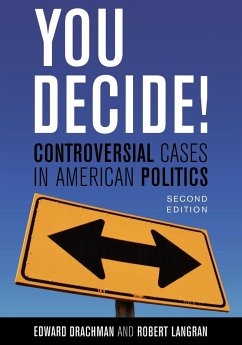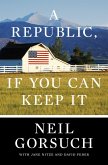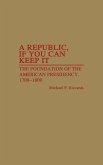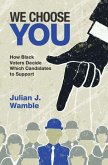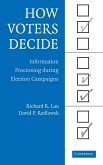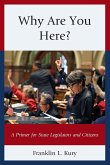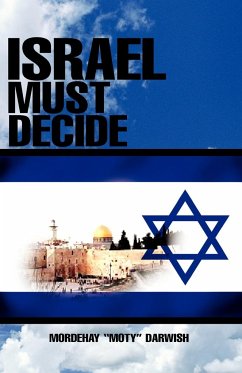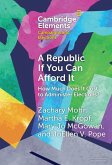- Broschiertes Buch
- Merkliste
- Auf die Merkliste
- Bewerten Bewerten
- Teilen
- Produkt teilen
- Produkterinnerung
- Produkterinnerung
The book is a unique and innovative assembly of 14 originally written cases on controversial topics in American government and politics. It is intended to engage students in active learning through discussion, debate and participation in the introductory American Government course.
Andere Kunden interessierten sich auch für
![A Republic, If You Can Keep It A Republic, If You Can Keep It]() Neil GorsuchA Republic, If You Can Keep It25,99 €
Neil GorsuchA Republic, If You Can Keep It25,99 €![A Republic, If You Can Keep It A Republic, If You Can Keep It]() Michael P. RiccardsA Republic, If You Can Keep It91,99 €
Michael P. RiccardsA Republic, If You Can Keep It91,99 €![We Choose You We Choose You]() Julian J. WambleWe Choose You95,99 €
Julian J. WambleWe Choose You95,99 €![How Voters Decide How Voters Decide]() Richard R. LauHow Voters Decide104,99 €
Richard R. LauHow Voters Decide104,99 €![Why Are You Here? Why Are You Here?]() Franklin L. KuryWhy Are You Here?38,99 €
Franklin L. KuryWhy Are You Here?38,99 €![Israel Must Decide Israel Must Decide]() Mordehay DarwishIsrael Must Decide22,99 €
Mordehay DarwishIsrael Must Decide22,99 €![A Republic If You Can Afford It A Republic If You Can Afford It]() Zachary MohrA Republic If You Can Afford It60,99 €
Zachary MohrA Republic If You Can Afford It60,99 €-
-
-
The book is a unique and innovative assembly of 14 originally written cases on controversial topics in American government and politics. It is intended to engage students in active learning through discussion, debate and participation in the introductory American Government course.
Hinweis: Dieser Artikel kann nur an eine deutsche Lieferadresse ausgeliefert werden.
Hinweis: Dieser Artikel kann nur an eine deutsche Lieferadresse ausgeliefert werden.
Produktdetails
- Produktdetails
- Verlag: Rowman & Littlefield Publishers
- Second Edition
- Seitenzahl: 228
- Erscheinungstermin: 10. August 2007
- Englisch
- Abmessung: 254mm x 178mm x 12mm
- Gewicht: 438g
- ISBN-13: 9780742538054
- ISBN-10: 0742538052
- Artikelnr.: 22697947
- Herstellerkennzeichnung
- Libri GmbH
- Europaallee 1
- 36244 Bad Hersfeld
- gpsr@libri.de
- Verlag: Rowman & Littlefield Publishers
- Second Edition
- Seitenzahl: 228
- Erscheinungstermin: 10. August 2007
- Englisch
- Abmessung: 254mm x 178mm x 12mm
- Gewicht: 438g
- ISBN-13: 9780742538054
- ISBN-10: 0742538052
- Artikelnr.: 22697947
- Herstellerkennzeichnung
- Libri GmbH
- Europaallee 1
- 36244 Bad Hersfeld
- gpsr@libri.de
Edward Drachman is professor of political science and international relations at the State University of New York at Geneseo. He has received awards as a teacher and student advisor and has authored several books and articles on political affairs. He resides in Geneseo, New York. Robert Langran is professor of political science at Villanova University and has been the recipient of the Distinguished Teaching and Faculty Service awards. He has authored three previous books and numerous articles. He resides in Villanova, Pennsylvania.
Chapter 1 The Constitution: Is Original Intent the Proper Model for
Constitutional Interpretation? Chapter 2 Federalism: Shoud Undocumented
Students Quaify for In-State Tuition Benefits from Pubic Colleges and
Universities? Chapter 3 Civil Liberties: Should Government-Sponsored Prayer
Be Allowed in the Public Schools? Chapter 4 Civil Rights: Race-Based
Affirmative Action in College Admissions: Keep it, Mend it, or End it?
Chapter 5 Political Socialization and Culture: Are Bilingual Programs the
Best Way to Teach Students with Limited English Proficiency? Chapter 6 The
Media: Should the U.S. media have shown the cartoons of the Prophet
Mohammed originally published in a Danish newspaper? Chapter 7 Political
Interest Groups: Are School Vouchers a Key to Meaningful Educational
Reform? Chapter 8 Political Parties and Campaigns: Is Campaign Reform
Needed? Chapter 9 Voting: What is the fairest method of redistricting?
Chapter 10 Elections: Is the Electoral College the Best Way to Elect U.S.
Presidents? Chapter 11 Congress: Should the Senate Continue the Practice of
the Filibuster? Chapter 12 The Presidency: How Limited Should Presidential
Power in Wartime? Chapter 13 The Judiciary: Should the case Kelo v. City of
New London be revisited? Chapter 14 Foreign Policy: What is the Best Exit
Plan for the U.S. in Iraq?
Constitutional Interpretation? Chapter 2 Federalism: Shoud Undocumented
Students Quaify for In-State Tuition Benefits from Pubic Colleges and
Universities? Chapter 3 Civil Liberties: Should Government-Sponsored Prayer
Be Allowed in the Public Schools? Chapter 4 Civil Rights: Race-Based
Affirmative Action in College Admissions: Keep it, Mend it, or End it?
Chapter 5 Political Socialization and Culture: Are Bilingual Programs the
Best Way to Teach Students with Limited English Proficiency? Chapter 6 The
Media: Should the U.S. media have shown the cartoons of the Prophet
Mohammed originally published in a Danish newspaper? Chapter 7 Political
Interest Groups: Are School Vouchers a Key to Meaningful Educational
Reform? Chapter 8 Political Parties and Campaigns: Is Campaign Reform
Needed? Chapter 9 Voting: What is the fairest method of redistricting?
Chapter 10 Elections: Is the Electoral College the Best Way to Elect U.S.
Presidents? Chapter 11 Congress: Should the Senate Continue the Practice of
the Filibuster? Chapter 12 The Presidency: How Limited Should Presidential
Power in Wartime? Chapter 13 The Judiciary: Should the case Kelo v. City of
New London be revisited? Chapter 14 Foreign Policy: What is the Best Exit
Plan for the U.S. in Iraq?
Chapter 1 The Constitution: Is Original Intent the Proper Model for
Constitutional Interpretation? Chapter 2 Federalism: Shoud Undocumented
Students Quaify for In-State Tuition Benefits from Pubic Colleges and
Universities? Chapter 3 Civil Liberties: Should Government-Sponsored Prayer
Be Allowed in the Public Schools? Chapter 4 Civil Rights: Race-Based
Affirmative Action in College Admissions: Keep it, Mend it, or End it?
Chapter 5 Political Socialization and Culture: Are Bilingual Programs the
Best Way to Teach Students with Limited English Proficiency? Chapter 6 The
Media: Should the U.S. media have shown the cartoons of the Prophet
Mohammed originally published in a Danish newspaper? Chapter 7 Political
Interest Groups: Are School Vouchers a Key to Meaningful Educational
Reform? Chapter 8 Political Parties and Campaigns: Is Campaign Reform
Needed? Chapter 9 Voting: What is the fairest method of redistricting?
Chapter 10 Elections: Is the Electoral College the Best Way to Elect U.S.
Presidents? Chapter 11 Congress: Should the Senate Continue the Practice of
the Filibuster? Chapter 12 The Presidency: How Limited Should Presidential
Power in Wartime? Chapter 13 The Judiciary: Should the case Kelo v. City of
New London be revisited? Chapter 14 Foreign Policy: What is the Best Exit
Plan for the U.S. in Iraq?
Constitutional Interpretation? Chapter 2 Federalism: Shoud Undocumented
Students Quaify for In-State Tuition Benefits from Pubic Colleges and
Universities? Chapter 3 Civil Liberties: Should Government-Sponsored Prayer
Be Allowed in the Public Schools? Chapter 4 Civil Rights: Race-Based
Affirmative Action in College Admissions: Keep it, Mend it, or End it?
Chapter 5 Political Socialization and Culture: Are Bilingual Programs the
Best Way to Teach Students with Limited English Proficiency? Chapter 6 The
Media: Should the U.S. media have shown the cartoons of the Prophet
Mohammed originally published in a Danish newspaper? Chapter 7 Political
Interest Groups: Are School Vouchers a Key to Meaningful Educational
Reform? Chapter 8 Political Parties and Campaigns: Is Campaign Reform
Needed? Chapter 9 Voting: What is the fairest method of redistricting?
Chapter 10 Elections: Is the Electoral College the Best Way to Elect U.S.
Presidents? Chapter 11 Congress: Should the Senate Continue the Practice of
the Filibuster? Chapter 12 The Presidency: How Limited Should Presidential
Power in Wartime? Chapter 13 The Judiciary: Should the case Kelo v. City of
New London be revisited? Chapter 14 Foreign Policy: What is the Best Exit
Plan for the U.S. in Iraq?

